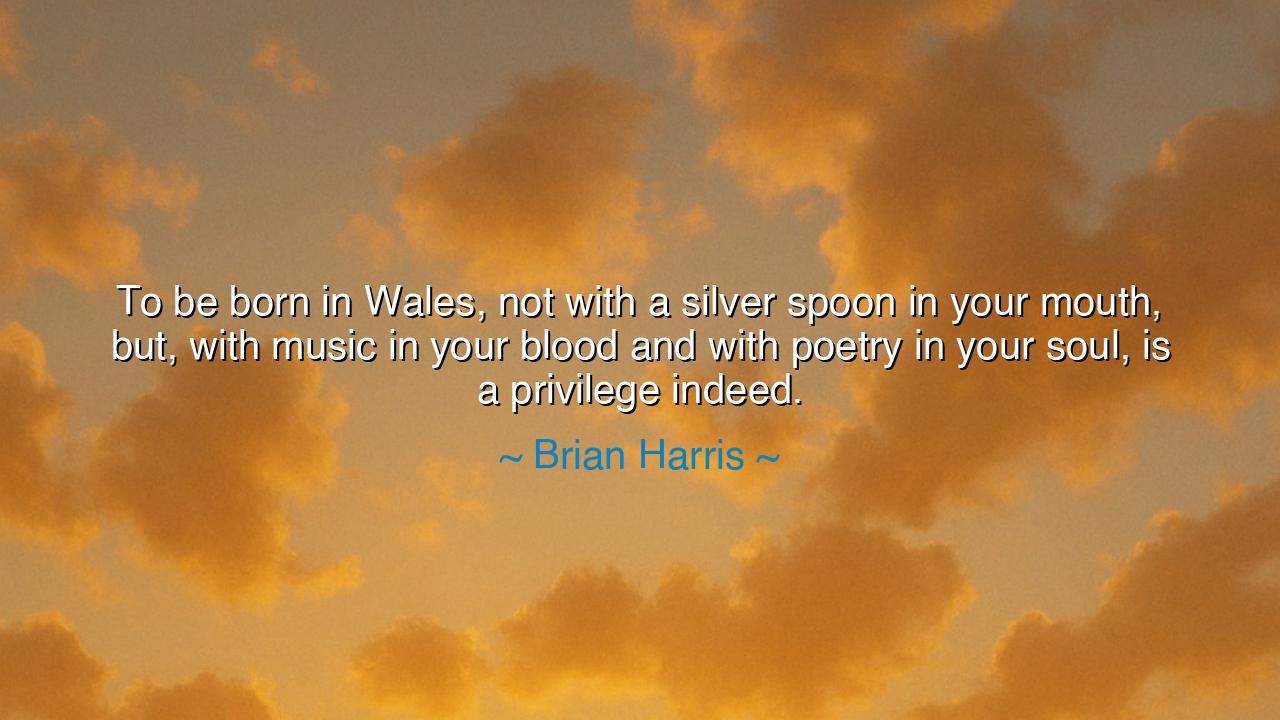
To be born in Wales, not with a silver spoon in your mouth, but
To be born in Wales, not with a silver spoon in your mouth, but, with music in your blood and with poetry in your soul, is a privilege indeed.






Brian Harris, with the reverence of one who knew his land’s soul, once declared: “To be born in Wales, not with a silver spoon in your mouth, but with music in your blood and with poetry in your soul, is a privilege indeed.” In this statement lies not only the pride of a people, but the unveiling of a deeper truth—that true wealth is not of gold or inheritance, but of spirit. To be born into a heritage of music and poetry is to inherit a treasure greater than crowns, for it shapes not only what a man possesses, but what he becomes.
The ancients too spoke of such wealth. They taught that the noblest riches are not the fleeting possessions of the body, but the eternal gifts of the spirit. The Greeks exalted the poet as the voice of the divine, the Romans honored the orator as the shaper of nations, and the Celts themselves wove sagas and songs that carried the heartbeat of their people. Harris, in his words, lifts this timeless truth: that to be born with music and poetry as your inheritance is to be born into a kingdom no power can overthrow.
Wales itself stands as a living testament to this inheritance. Known as “the land of song,” it has birthed voices that have echoed across the world. In chapel and in field, in coal mine and in marketplace, the Welsh raised their voices in hymns and ballads, not as ornament, but as sustenance. When poverty shadowed their homes, when hardship weighed heavy, they turned not to bitterness but to music and poetry, finding in them strength to endure and reason to hope. Truly, as Harris said, this is a privilege greater than any silver spoon.
Consider the story of Dylan Thomas, whose words poured out like fire and ocean mingled. He did not spring from noble wealth, but from the fierce inheritance of his land’s poetry. His verse, woven with passion and sorrow, carried Wales to the ears of the world. Or think of the coal miners, weary from labor in the dark, who would gather in choirs and fill the air with harmony so rich it seemed heaven itself bent down to listen. These are the children of Wales, whose music and poetry became their light in the shadows.
Yet Harris’ words do not speak only of Wales. They remind all peoples that the truest inheritance is not what is placed in the hand, but what is planted in the soul. Many envy those born with wealth, with privilege of silver and power. But what is that compared to the fire of music within, the well of poetry that overflows from the heart? Riches can be squandered, silver tarnishes, but the wealth of spirit only grows as it is shared. To be born with such a gift is indeed a privilege beyond measure.
The lesson is clear: seek not only the treasures of the world, but honor the treasures of the spirit. If you were not born with silver in your hand, look instead to what lies in your heart. Do you carry the gift of song, of words, of compassion, of imagination? These are riches far greater. Harris reminds us that to live with music in the blood and poetry in the soul is to possess a wealth no thief can steal.
Practical wisdom follows: nurture the gifts within you. Sing, even if the world does not applaud. Write, even if few will read. Cherish your heritage, your culture, your voice. And if you feel poor in coin, remember that wealth is not measured in metal, but in meaning. Share your music, offer your poetry, and you will find yourself richer than kings.
So let Brian Harris’ words stand as an eternal reminder: “To be born in Wales… with music in your blood and with poetry in your soul, is a privilege indeed.” Carry this wisdom not only as a celebration of a people, but as a call to every soul—to honor the unseen inheritance within, and to live as one who knows that the truest wealth is not silver, but the eternal treasures of the spirit.






AAdministratorAdministrator
Welcome, honored guests. Please leave a comment, we will respond soon